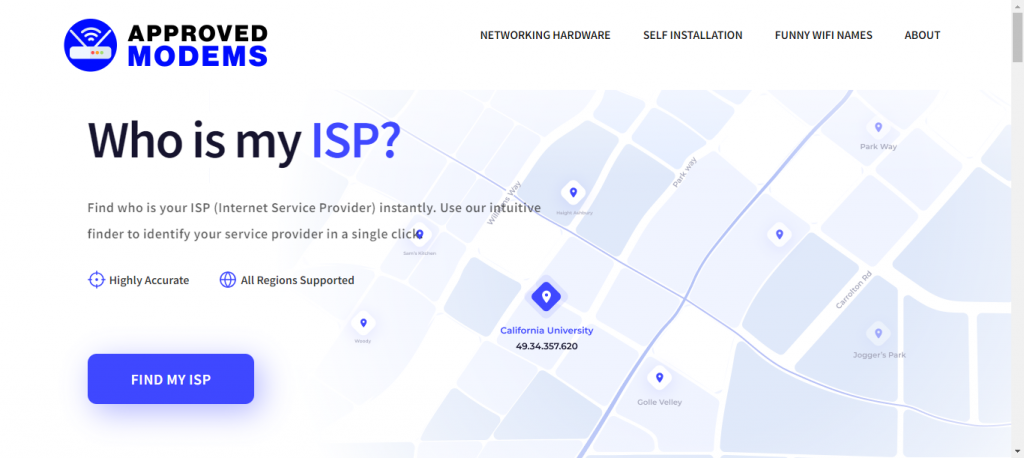Wondering who your internet provider is? You can quickly and easily find out who your internet service provider (ISP) is by following a few simple steps.
This guide provides detailed instructions on how to check your ISP and what information you need to do so.
What is Internet Service Provider?
An Internet service provider (ISP) is a company that provides access to the internet. ISPs can offer a variety of services, including dial-up, DSL, cable, satellite, and fiber optic internet.
ISPs play a vital role in the Internet ecosystem. They provide the infrastructure that allows people to connect to the internet and access websites, email, and other online services. ISPs also play a role in routing traffic and ensuring that the internet is fast and reliable.
How do ISPs work?
ISPs have a network of servers and cables that connect them to the internet backbone. The internet backbone is a high-speed network that connects all of the major ISPs in the world.
When you sign up for an internet service plan from an ISP, they will give you a modem and router. The modem is used to connect your home network to the ISP’s network. The router is used to distribute the internet connection to all of the devices in your home.
Once your modem and router are set up, you will be able to access the internet. When you visit a website, your request is routed through the ISP’s network to the server where the website is hosted. The server then sends the website’s content back to your computer through the ISP’s network.
How to find out your Internet Service provider?
Use online tools to discover your ISP
These “who is my ISP” tools are typically easy to use and only require your IP address to provide you with the name of your ISP.
Who is my ISP is a popular tool by Approved Modems. This website allows you to easily find your IP address and provides additional information about your ISP, such as their location and contact information. Another option is the “Who is my ISP” tool offered by WhoIsHostingThis.com, which also provides information about your hosting provider and domain name.

While these tools can be helpful, it’s important to note that they may not always provide accurate information. This is because some ISPs use dynamic IP addresses, which can change frequently. If you’re unsure of the accuracy of the information provided by a “who is my ISP” tool, you can always contact your ISP directly for confirmation.
Overall, “who is my ISP” tools can be a convenient way to quickly identify your internet service provider. Just be sure to double-check the information provided and keep in mind that it may not always be 100% accurate.
Check for Labels on Your Modem or Router.
One of the easiest and quickest ways to identify your internet service provider is to look for labels on your modem or router. Most ISPs will include labels or text indicating their network, so simply locate these labels and check for the name of your ISP. These labels can often be found either directly on the modem/router itself or might be printed on a sticker adjacent to it. If you still are not able to find any information after inspecting the device, then other methods can help you in this process.
Receipts Can Reveal Who Is Providing You Internet Service.
Going through receipts and invoices related to your internet service is another helpful way to determine who the ISP is. ISPs typically bill their customers for the internet service provided, so make sure to check through any records of recent billing statements or payments associated with your network. You can also try checking in with a local cable service provider’s website – they will usually indicate which ISPs serve your area.
Use Speed Test Sites to Identify Your Provider.
Speed test sites are a great way to identify your internet service provider, especially if you’re not sure who it is. Many of these sites will provide you with some basic information about your connection such as the current speeds and quality of service. All you need to do is enter your postal code and then run the speed test – the ISP name associated with your connection should be in this report.
Contact Your Utility Company for Assistance with Determining the Provider.
Utility companies are a great resource for finding out your internet provider. Simply contact the company and provide them with your address to confirm who your service is through. If you have access to past bills, you can also look it up there. Additionally, the customer service representative will be able to check your account and provide you with more details about the types of services that you have access to.
Reach Out to Customer Service if You’re Still Unsure of the Provider.
If you’re still unsure of who your internet provider is, don’t hesitate to reach out for customer service. A helpful customer service representative will be able to confirm who your provider is and provide you with more information about their services such as speeds and pricing. They can also tell you if other providers offer services in your area.
What are the different types of ISPs?
There are four main types of ISPs:
- Dial-up ISPs: Dial-up ISPs use telephone lines to connect users to the internet. Dial-up internet is the slowest type of internet available, but it is also the most affordable.
- DSL ISPs: DSL ISPs use existing telephone lines to provide high-speed internet access. DSL internet is faster than dial-up internet, but it is also more expensive.
- Cable ISPs: Cable ISPs use cable TV lines to provide high-speed internet access. Cable internet is typically faster than DSL internet, but it is also more expensive.
- Satellite ISPs: Satellite ISPs use satellites to provide internet access to remote areas where other types of internet service are not available. Satellite internet is typically the most expensive type of internet service, but it is also the most reliable.
How to choose an ISP
When choosing an ISP, there are a few factors to consider:
- Speed: How fast do you need your internet connection to be? If you are a single user who primarily browses the web and checks email, then a speed of 25 Mbps or higher is sufficient. If you have a household with multiple users who stream video, play online games, and download large files, then a speed of 100 Mbps or higher is recommended.
- Price: How much are you willing to pay for internet service? ISPs offer a variety of plans with different speeds and prices. It is important to compare plans and choose the one that best meets your needs and budget.
- Data cap: Some ISPs impose data caps on their customers. A data cap is a limit on the amount of data that you can download or upload each month. If you exceed your data cap, you may be charged additional fees.
- Customer service: ISPs have different reputations when it comes to customer service. It is important to read online reviews and compare customer service ratings before choosing an ISP.
Once you have considered these factors, you can start comparing ISPs and choose the one that best meets your needs.
FAQ
Who is my internet provider?
Your internet provider is the company that provides your internet connection. They are responsible for delivering the data from the internet to your home or office.
How do I find out who my internet provider is?
There are a few ways to find out who your internet provider is. The easiest way is to check your monthly bill or statement. It should have the name of your provider on it. If you don’t have a bill, you can also check the modem or router that you use to connect to the internet. It may have a label with the provider’s name on it. Another way to find out is to search online for “who is my internet provider” and enter your zip code or address.
Can I change my internet provider?
Yes, you can change your internet provider if you are not happy with their service or if you find a better deal elsewhere. However, switching providers may require canceling your current service and signing up with a new provider. You may also need to purchase new equipment, such as a modem or router if your current equipment is not compatible with the new provider’s network.
How do I choose a new Internet provider?
When choosing a new internet provider, consider factors such as the speed and reliability of the service, the cost, and any special features or promotions that the provider offers. You may also want to read reviews from other customers and compare the provider’s coverage in your area.
How do I contact my internet provider?
You can usually contact your internet provider by phone, email, or online chat. Check your provider’s website for contact information or customer support options. If you are having technical issues with your service, you may need to contact your provider’s technical support team.
Conclusion
In conclusion, knowing who your internet provider is can help you troubleshoot any issues you may be having with your internet connection. It can also be useful if you are considering switching providers or upgrading your service. By checking your bill, modem, or router label, or searching online, you can easily find out who your internet provider is.
If you decide to switch providers, be sure to consider factors such as speed, reliability, and cost before making a decision. And if you need to contact your provider for any reason, you can usually do so by phone, email, or online chat.




